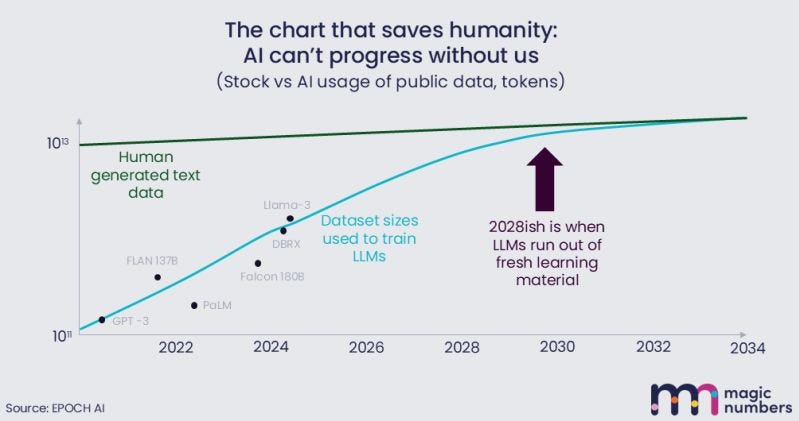#54 – On dehumanisation
Welcome back.
Spring has arrived in London and during one of last week’s nursery runs I noticed how the world just looked suddenly a little more uplifting in that bright, warm morning sun. Not only were trees, bushes, and plants seemingly straightening up – people were walking more upright, too, rather than merely stumbling forward. Chins were held up high rather than being tucked in. Eyes were darting around, daringly, taking in bright blues, deep greens, soft pastels, rather than locking onto a faintly gleaming screen. It’s the warm, optimistic counter point to a lot of the articles that I’m sharing in this edition. (Apologies for that.) All of which centre around one theme.
I’ve been pondering the consequences of asynchronous communication for a while now but never dared to write anything down, fearing it’s all too obvious. Plus the usual worry of being late to the game, as usual. But on days like today, when life so forcefully is breaking through a shell of winterly suppression, I couldn’t no longer deny the fact that a lot of the articles and observations shared in media and within my little filter bubble have one red thread: the loss of our humanity. Or, less dramatic, the change of our human nature. Or, more dramatic, the gradual dehumanisation.
It’s things like the world’s biggest (or second biggest) opportunist proclaiming empathy a flaw; the loneliness epidemic; the mental health crisis; the big “sloppening”; advances of and attacks by AI in art and other spaces; our cognitive decline. A lot of this can be attributed in some shape or form to technology. The more brutal stuff of it to the screen-bearing devices in our pockets (or on those dangly straps around people’s neck’s.) Those have taken asynchronous communication one step forward and probably too far. They have made it the norm. Text messages. Voice notes. Stream of consciousness videos. All safely consumed at a physical (and emotional) distance. Thinking about it, it’s not a big surprise that a world relying on asynchronous, intermediated communication has a hard time to live in harmony (or synchrony). But.
Let’s continue this conversation in the links.
Six Links of Inspiration.
The Age of Streaming Inequality. This isn’t as much an article about inequality as it is a testament to commercial limitations. What started as a big revolution in streaming, whether that’s music or movies, is now starting to morph into a carbon copy of the very business models they vowed to disrupt. It’s the circle of commercial life and the realisation that people are only willing to spend money on so many things. As a business, you can monetise people’s desire for quality experience. Or, once you hit a certain threshold, their attention. And so the inevitable fate of every disruptor is to become the incumbent where the tactics that scaled you aren’t the same ones that will keep you growing and going.
Have humans passed peak brain power? If you’re one of those grumpy cynics that think they’re increasingly surrounded by idiots, this article probably serves as a welcome confirmation. People’s cognitive skills seem to be taking a nosedive. Or maybe just a well-deserved break. Why would we use our precious brain power to reason, read, and calculate when we can outsource all of these things to little machines in our pockets? Maybe we’ve been using that resource to imagining new futures, new ideas, new songs, new books, new films, new forms of entertainment. But judging by the increasingly bland creative output in the world, that’s probably not (yet) the case.
Sex Without Women. As a father of a little boy, there’s plenty of media coverage these days that have the potential to worry (or scare the shit out of) me. What men are doing with tech and what tech is doing to men is worrying. If they start to prefer tech to touch it’s not a surprise that empathy is getting the cold shoulder. The normalisation of dangerous and harmful attitudes, comments, and behaviours proliferated by careless algorithms or careless people among (in this case) young men and boys, and the real-life impact on full, painful display in an article in issue 623 of Stylist magazine that explores what it’s like to be a girl in 2025. I’m also the father to a little girl. Fun times ahead.
AI: Dystopia or Utopia? This is a long-read, so clear your diary for that one. It’s an interesting take on AI that goes beyond the immediate hype and looks at the technology’s potential impact over the next 50 years. It’s mostly positive, which isn’t a surprise, considering its coming from a self-proclaimed techno-optimist, but maybe it’s worth thinking about the longterm positives for a change while the technology is poised to clog the arteries of the internet and our scarce attention with slop. (Cue to read The Sloppening by Joe Burns.)
The loudest megaphone: how Trump mastered our new attention age. This is a few weeks old and I only reluctantly post things about a person who’s too omnipresent in our lives anyway. (Which kind of proves the point of this piece.) Or who contributes to (or drives?) the normalisation of sexist, aggressive, backwards behaviours. But as we’re working and living in this age of attention it is impossible to not consider this piece and what it postulates: “Postman [author of ‘Amusing Ourselves to Death’] didn’t quite frame his argument in terms of attention, but what I take from it is that in competitive attention markets, amusement will outcompete information, and spectacle will outcompete arguments.” Once there’s enough entertainment and content and stuff out there, people won’t have the inclination to seek out the truth (or anything that would challenge their view of the world.) And even if they would, chances are they wouldn’t understand it anymore, because the flattening of culture will have reduced the quality of our thinking and understanding. “Saunders’ critique runs deeper than the insidious triviality and loudness of major TV news. He’s making the case that the sophistication of our thinking is determined to a large degree by the sophistication of the language we hear used to describe our world.” (It’s an odd link to the piece above about the demise of our cognitive abilities.) And once there’s enough of all of that, you can win political arguments (and, maybe, any argument) “by pulling off the improbable trade of persuasion for attention, likability for salience.”
The lost art of eye contact. I remember my parents constantly telling me as a kid to look people in the eyes when asking them something or talking to them. Seems like not enough people have been giving this advice to their children, judging by this TIME article. Apparently, “62% of educators believe children are worse at making and maintaining eye contact than in years past.” A “cultural shift away from face-to-face engagement…that has profound implications for how we communicate and connect.” (via Tom Novac)
That’s it for this time. To end on a slightly more uplifting note. Here’s a interesting chart shared today by Dr. Grace Kite, showing that despite all the advances in AI, large language models will have absorbed all of humanity’s generated data by 2028. Her take is that regardless whether AI will learn from its own data (and degenerate) or learn to apply more nuance (and improve), human-created ideas will become scarcer and therefore a corresponding re-evaluation of it will happen. Whether that saves humanity remains to be seen.
If you liked this edition, please share it with your fellow humans. If not, share it with a bot or an algorithm.
Read you all next time!





